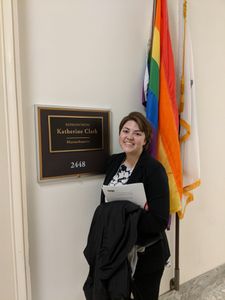Learning How Public Policy Affects Early Childhood Education
Learning How Public Policy Affects Early Childhood Education
By: Krissy Hathaway

This past February, I had the opportunity to attend the National Association for the Education of Young Children (NAEYC) Public Policy Forum in Arlington, Virginia. Five other BU Wheelock early childhood education students and two of our professors traveled to the forum to learn how policy affects early childhood education, and how to advocate for the profession.
Among the 400 people attending the forum were early childhood educators, administrators, higher education professionals, parents, students, and advocates, all fighting for advances to the field. The first two days consisted of discussions regarding current issues in early childhood education, as well as policies that both, directly and indirectly, affect the field.
In many of our conversations, we discussed the need for increased compensation of early childhood educators. Teachers are notoriously underpaid, and this is especially true for early childhood educators. It was something that hit home for me as, following graduation, I’ll be working towards paying off my student loans.
One of the sessions that surprised me the most was the session on the 2020 Census. Funding for many early childhood programs is influenced by the data from the census. The problem is that historically young children and babies have been drastically undercounted. When children are miscounted, it affects funding for the next ten years until the next census. Many families are also concerned about who has access to their very personal census data.
However, the data isn’t made public until 72 years from now, specifically to protect people’s personal information. This is just one example of information we learned that we could use to support and ease the worries of the families and other individuals we work with.
At the policy forum, we were able to work with other professionals from Massachusetts who work in a diverse range of settings and roles. We heard their opinions about the current early childhood issues for our state. Many of them were concerned about accessibility to high-quality early childhood education programs, as many programs have long waitlists of families hoping to enter their program.

On the third day of the forum, we met with staff members for our state representatives. This was our opportunity to advocate for policies that would improve early childhood education. My first meeting was with Senator Elizabeth Warren’s senior education policy advisor. Next, I met with Representative Katherine Clark’s legislative assistant. Lastly, I met with Representative Seth Moulton’s legislative assistant. They listened intently, asked questions, and were supportive of our goals. It was empowering to feel like our voices were being heard.
Leaving the policy forum, I had a reinvigorated enthusiasm for the work I have chosen to do as well as the knowledge to be able to navigate policy work in the future. Most importantly I left feeling like I had an important story to tell and that my voice mattered.
Krissy Hathaway is a senior at BU Wheelock enrolled in the 4+1 track and expects to complete a master’s degree in early childhood education next year.